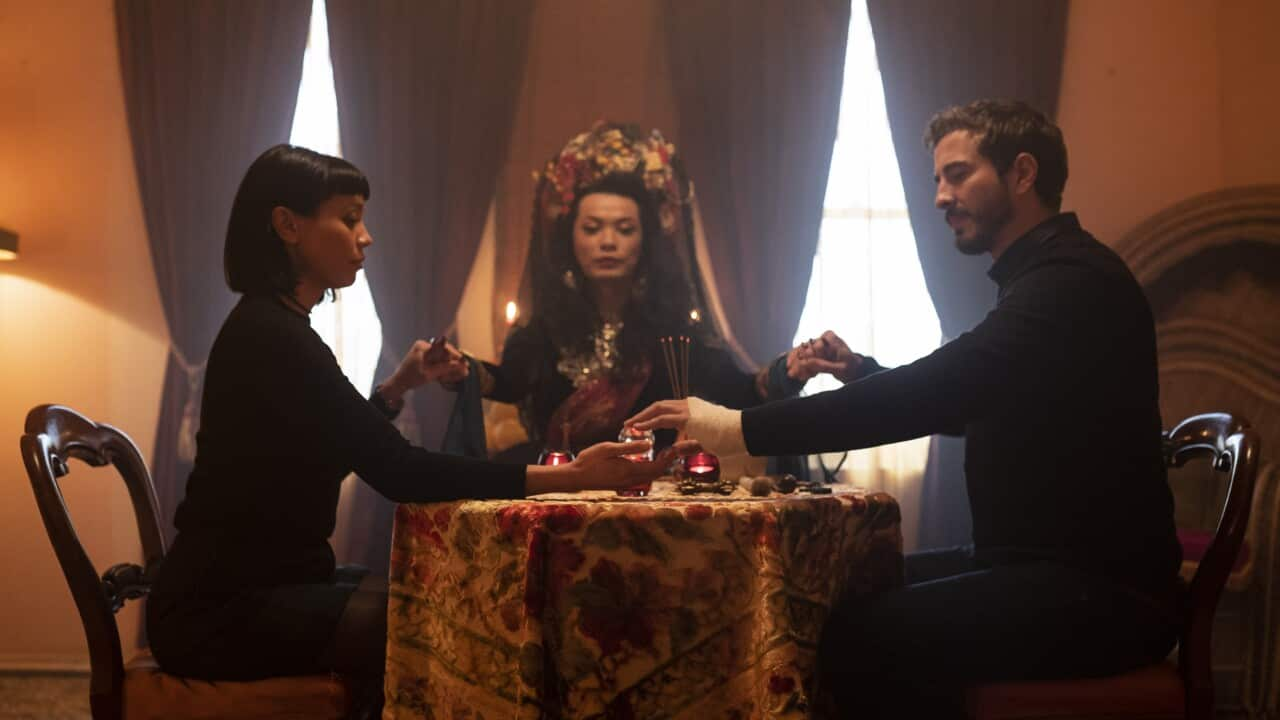There aren’t many series where a cold-blooded political assassination ends up being the least exciting thing going on. Usually a case of attempted murder – one almost certainly carried out on the direct orders of Vladimir Putin – would be the part of the story that holds an audience’s attention. But in real-life drama The Salisbury Poisonings, that’s only the beginning.
It’s 4 March 2018, and former Russian solider and MI6 agent Sergei Skripal and his daughter Yulia are found foaming at the mouth and almost unconscious on a park bench outside a shopping centre in the small UK town of Salisbury. Initially it looks like a drug overdose, but right from the start something about the situation doesn’t seem quite right. It only takes a quick google check of Sergei’s name for Detective Sergeant Nick Bailey (Rafe Spall) to realise they’re dealing with a case with possible international ramifications. What they don’t figure out until it’s too late is that they’re also dealing with a major public health crisis. It may be unintentional (filming on the series finished early this year), but The Salisbury Poisonings is often an eerily accurate look at our current coronavirus crisis. The spy drama here rapidly becomes incidental to the plot; after the opening scenes the Skripals aren’t seen again (they both survived). The real drama here is the threat that whatever mysterious substance made them so ill may already be spreading through the community.
It may be unintentional (filming on the series finished early this year), but The Salisbury Poisonings is often an eerily accurate look at our current coronavirus crisis. The spy drama here rapidly becomes incidental to the plot; after the opening scenes the Skripals aren’t seen again (they both survived). The real drama here is the threat that whatever mysterious substance made them so ill may already be spreading through the community.

The clean-up begins. Source: SBS
There are scenes in this four-part series that might have come directly from the nightly news. Health experts in PPE (how many of us even knew what that was six months ago?), shops and public spaces being shut down to avoid the spread of a lethal substance, tracking and tracing a growing list of possible contacts to try and curtail the spread. The origin of the sickness might be very different, but the almost cold-blooded way it plays out here feels chillingly accurate.
In an attempt to figure out what’s tearing the Skripals’ bodies apart, their medical tests rapidly move from the local hospital to the UK’s top medical lab at Porton Down. Meanwhile, the director of public health for the region covering Salisbury, Tracy Daszkiewicz (played by Anne-Marie Duff), takes over the investigation into finding out who or what the Skripals have been in contact with. The bad news is that the pair were poisoned with a synthetic toxin called Novichok (Russian for “newcomer”), one of the deadliest substances on the planet. It’s so toxic Detective Sergeant Bailey is poisoned during his search of Sergei’s home despite taking every precaution up to and including wearing a full-body protective suit. Whoever wanted the pair dead wasn’t taking any chances.
The bad news is that the pair were poisoned with a synthetic toxin called Novichok (Russian for “newcomer”), one of the deadliest substances on the planet. It’s so toxic Detective Sergeant Bailey is poisoned during his search of Sergei’s home despite taking every precaution up to and including wearing a full-body protective suit. Whoever wanted the pair dead wasn’t taking any chances.

Tracy Daszkiewicz (Anne-Marie Duff). Source: SBS
The worse news is that Novichok might have already been spread all over town, thanks in part to cleaners innocently hosing the Skripals’ vomit off the park bench and into the local sewerage system. Daszkiewicz’s preventative measures swing into high gear, but with something so potentially deadly, they’re looking for a needle in a city full of haystacks.

DS Nick Bailey (Rafe Spall). Source: SBS
Shifting effortlessly between edge-of-the-seat thriller and human drama, this brings (recent) history to life from an angle most reports overlooked. But it’s the sense of a vast unseen killer moving through an average town that really lingers. Salisbury was touched by the kind of major international event the residents usually only saw on the news and it shook their community to the core. In 2020, that’s something we can all sympathise with.
All four episodes of The Salisbury Poisonings are available . Start with episode 1 now:
When you're done: Listen to The Salisbury Poisonings creators/writers Declan Lawn and Adam Patterson talk us through the delicate process of adapting true stories for the screen
Follow the author here:
More from The Guide

The real-life characters behind hit UK drama 'The Salisbury Poisonings'







